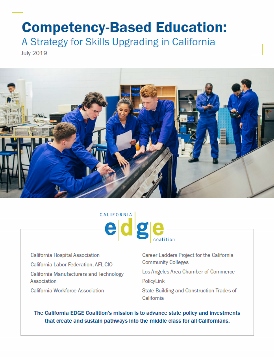The California Legislature and Governor Newsom have both made clear that addressing the skill needs of underserved populations, including low-wage workers, is a pressing priority. A new policy brief released by the California EDGE Coalition examines the ways in which other states are now successfully employing competency-based approaches to teaching and learning which allow students to move flexibly – and often much more quickly – through an educational program that is designed to make sure they know and can do what is expected of graduates. This approach has clear benefits to students, employers, and the state:
• Students benefit from well-defining learning goals and flexible pacing;
• Employers benefit from better information about job candidates – in the form of what graduates know and can do – and training programs aligned with workforce needs;
• States benefit from workforce training with potentially better outcomes and lower costs to students and taxpayers.
Numbers of states are moving to integrate Competency-Based Education (CBE) more fully into their educational system and national efforts are underway to support these efforts. California’s new online college is committed to CBE and community colleges, such a Los Angeles Trade Technical College, have done pioneering work to provide CBE options to their students. “Competency-Based Education: A Strategy for Skills Upgrading in California” suggests ways in which California policymakers might help extend the reach of these kinds of programs.

